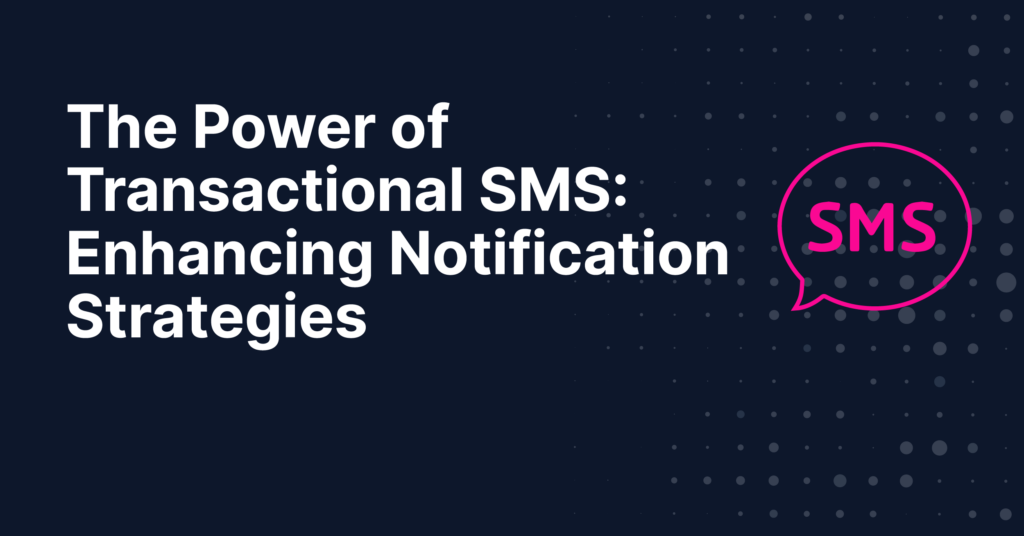Transactional SMS plays a crucial role in modern communication strategies, enabling businesses to send timely alerts and notifications directly to their customers’ mobile phones.
This article delves into the essence of transactional SMS, highlighting its importance for maintaining effective customer engagement.
You will gain insights into the benefits of integrating transactional SMS into their notification strategies, explore a variety of use cases across different industries, and understand the latest statistics and trends that underscore its effectiveness.
By the end, businesses will be equipped with the knowledge to leverage transactional SMS for improved communication, customer satisfaction, and operational efficiency.
1. What is Transactional SMS?
Transactional SMS refers to messages sent by businesses to provide customers with important information related to transactions or account activity.
Unlike promotional SMS, which is used for marketing purposes to promote products or services, transactional SMS is focused on essential communication that recipients need or expect to receive.
-
Key Characteristics:
-
Content:
-
Contains information the recipient needs, such as order confirmations, booking details, or account alerts.
-
-
No Promotional Material:
-
Purely informational, without any advertising content.
-
-
Recipient Consent:
-
Not required for customers who have initiated a transaction or have an existing relationship with the business.
-
-
24/7 Delivery:
-
Can be sent at any time, ensuring timely receipt of crucial information.
-
-
Global Reach:
-
Effective for reaching customers worldwide with immediate, relevant updates.
These characteristics distinguish transactional SMS as a direct and efficient communication channel for businesses to maintain transparency and trust with their customers.
2. Benefits of Transactional SMS for Businesses
The use of transactional SMS offers significant advantages for businesses aiming to provide timely alerts and notifications:
-
-
Immediate Delivery:
-
Ensures critical information reaches customers instantly, facilitating prompt actions or decisions.
-
-
High Open Rates:
-
SMS boasts nearly a 98% open rate, significantly higher than email, ensuring messages are seen and read.
-
-
Enhanced Customer Experience:
-
Timely updates on transactions or account activities build trust and satisfaction among customers.
-
-
Reliability:
-
Less susceptible to spam filters compared to emails, transactional SMS messages are more likely to be delivered successfully.
-
-
Cost-Effective:
-
Provides an economical way to communicate important information without extensive infrastructure.
-
-
Accessibility:
-
Reaches customers directly on their mobile devices, even without internet access, ensuring broad accessibility.
These benefits underscore transactional SMS as a powerful tool for enhancing customer engagement, operational efficiency, and overall communication effectiveness.
3. Key Use Cases of Transactional SMS
Transactional SMS finds critical applications across various industries, each leveraging its immediacy and reliability to enhance customer interaction and operational efficiency:
Sends order confirmations, shipping updates, and delivery notifications to keep customers informed about their purchases.
Delivers account alerts, transaction confirmations, and security codes for two-factor authentication, ensuring customers are up-to-date and secure.
Provides booking confirmations, check-in alerts, and flight status updates, enhancing the travel experience with timely information.
-
-
Healthcare:
-
Sends appointment reminders, prescription refill notices, and test results, improving patient engagement and care continuity.
-
-
Education:
-
Communicates class schedules, exam notifications, and emergency alerts to students and parents, fostering a connected and informed educational community.
In each case, transactional SMS serves as a direct line to the recipient, offering relevant, timely information that enhances the user experience and supports efficient service delivery.
4. Effectiveness and Adoption Statistics
Transactional SMS remains a powerful and effective communication channel for businesses, boasting exceptional reach, engagement, and conversion rates. Here’s a data-driven exploration of its effectiveness and adoption:
-
Effectiveness:
-
High Open Rates:
-
Compared to other channels, transactional SMS enjoys unparalleled open rates. A 2023 study by Sinch reveals that 98% of SMS messages are opened, making it highly likely your message will be seen by the recipient.
-
-
High Conversion Rates:
-
Transactional SMS effectively drives desired actions from recipients. A 2022 Klaviyo study found that SMS marketing campaigns boast an average click-through rate of 19%, exceeding email marketing rates.
-
-
Improved Customer Experience:
-
Timely delivery of order updates, shipping notifications, and appointment reminders keeps customers informed and reduces frustration. A 2022 Yotpo study revealed that 74% of consumers appreciate receiving these types of transactional messages via SMS.
-
Adoption:
-
Global Reach:
-
Nearly everyone carries a mobile phone, making SMS a highly accessible communication channel. Statistics by the GSMA reveal that 93% of the global population has access to mobile networks (2G, 3G, 4G) in 2023, indicating the widespread coverage of SMS.
-
-
Cost-Effectiveness:
-
Compared to other marketing channels, SMS offers a cost-effective communication method, making it accessible to businesses of all sizes.
The statistics paint a clear picture: transactional SMS remains a powerful tool for businesses to reach customers effectively, drive engagement, and achieve communication goals.
5. Designing Effective Transactional SMS Notifications
Designing effective transactional SMS notifications involves adhering to best practices that ensure messages are impactful, engaging, and valued by recipients:
-
-
Clarity and Conciseness:
-
Keep messages clear and to the point, conveying essential information without unnecessary details.
-
-
Personalization:
-
Use customer data to personalize messages, addressing recipients by name and tailoring information to their specific needs or actions.
-
-
Timeliness:
-
Send notifications at appropriate times, considering the urgency of the information and the recipient’s time zone.
-
-
Actionable Information:
-
Include any necessary actions the recipient needs to take, making it easy for them to respond or follow up.
-
-
Compliance:
-
Ensure messages comply with legal requirements and industry standards, including opt-out options.
-
-
Testing and Optimization:
-
Regularly test message formats and timings to find the most effective strategies for engagement and response.
By following these guidelines, businesses can craft transactional SMS notifications that enhance customer experience and foster positive engagement.
You may also be interested in:
Choosing the Right SMS Provider: A Guide for Businesses
Securing Communications with OTP via SMS: Best Practices
6. Conclusion
In conclusion, transactional SMS plays a pivotal role in modern notification strategies, emerging as a key tool for businesses seeking to enhance customer engagement. Its immediacy, high open rates, and directness make it an indispensable channel for delivering timely and relevant information.
By integrating transactional SMS into their communication strategies, businesses can provide a superior customer experience, marked by convenience, reliability, and personalized interaction. This approach not only meets but exceeds customer expectations, fostering trust and loyalty.
The impact of transactional SMS on customer engagement is profound, offering businesses a powerful means to connect with their audience and drive satisfaction in the digital age.
7. FAQs About Transactional SMS
-
What is the difference between transactional and promotional SMS?
The difference between transactional and promotional SMS lies in their content and purpose.
Transactional SMS is used to send necessary information related to transactions or services to customers, such as order confirmations or account alerts, and can be sent to all customers, including those who have opted out of marketing messages.
Promotional SMS, on the other hand, is intended for marketing purposes, promoting products, services, or offers, and is sent only to customers who have opted in to receive such messages.
-
What are the advantages of transactional SMS?
Transactional SMS offers several advantages, including immediate delivery for timely updates, high open rates ensuring messages are read, enhanced customer experience through relevant notifications, reliability in message delivery, cost-effectiveness as a communication tool, and wide accessibility, reaching customers directly on their mobile phones even without internet access.
These benefits make transactional SMS a powerful tool for businesses to maintain effective and efficient communication with their customers.
-
Do you need an opt out for transactional SMS?
No, an opt-out is not typically required for transactional SMS, as these messages contain important information related to transactions or account activity that the recipient has a relationship with or has consented to receive.
However, best practices suggest including opt-out options when possible to respect recipient preferences and ensure compliance with local regulations.
-
What is an example of a transactional SMS?
An example of a transactional SMS is a message sent to a customer confirming their online order: “Your order #12345 has been successfully placed and will be shipped to you within 3-5 business days. Thank you for shopping with us!”
This SMS provides essential information related to a transaction the customer has initiated.



